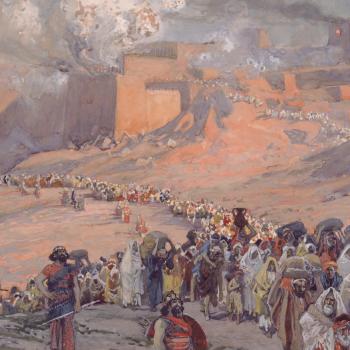Editor's Note: Below is a "Monday Sermon," from our series of sermons at the Patheos Preachers Portal that pastors can enjoy and learn from. It is our hope that this particular series from Daniel Harrell, which preaches through the Church Fathers, will encourage pastors, show them a way of approaching theological education from the pulpit, and refresh their theological memories. See Reverend Harrell's columnist page for more information.
I once spoke at a church that meets in a coffee shop loft near Duke University. Worshipers gathered in a semi-circle on comfortable couches rather than straight-back pews as two guitarists sang self-composed songs about God's beauty and compassion. The prayers were simple and the sermon was more dialogue than monologue as the pastor and I went back and forth on the cheery topic of what it means to sacrifice for Jesus.
As I was making some articulate point about how technology impedes our capacity for sacrifice, my cell phone rang. Ironic. I reached to shut it off—first checking to see who it was, of course; you know, just in case I needed to take it. And sure enough it was a guy from my own church who was pinch-hitting for a missing-in-action media operator. The band had already started to play but nobody could sing because the slide program wouldn't work. So I excused myself from my sermon in Durham to help get the service going in Boston.
The Durham church went retro with Xerox copies of songs on color-coded paper. There were only about thirty people present in church, which was actually by design. Their intentionally limited size fostered a kinship that was also influenced by the way they celebrated communion. Rather than emphasizing solemnity out of respect for the crucified Christ, they emphasized the life they shared because of the risen Christ. No queuing up to individually partake of the body and blood in somber silence. Instead, the bread and wine were set out at the back where you were free to grab a cup and a slice of Jesus as you mingled with the rest of the church. I'll admit at first it seemed like a not-so-sanctified cocktail party, but on second thought, having Jesus in your hands should signal us as resurrected-people-to-be to gladly connect with each other since we plan to be together for eternity. Aside from the deliberately solemn season of Lent, perhaps celebrating communion should be more of a celebration. Jesus did rise from the dead after all. Yet somehow we've been trained to treat communion more like going to a funeral as if Jesus still had some dying to do. Why is that?
Well, it's in large part due to Gregory the Great, who comes from the Roman side of 6th-century church history, a time during which Rome took a back seat to Constantinople. Born in Rome during the downfall of the Roman Empire, Gregory the Great almost single-handedly saved western Christianity from probable extinction. And not only did he save it, but he radically reshaped it too.
Gregory solidified the idea that at the mass, or communion, Jesus is sacrificed anew (in a way). This idea was accompanied by another Gregorian innovation: the doctrine of purgatory. Gregory argued that because sins committed by baptized Christians are sins against the church, they must be forgiven by the church, represented by a priest. To die without this absolution would land you in purgatory until such time that absolution was conferred. Gregory's rationale for this came from Matthew 12, where Jesus said that "every sin will be forgiven except blasphemy against the Holy Spirit which will not be forgiven, either in this age or in the age to come." Gregory concluded that by mentioning forgiveness in the age to come, Jesus held out for future pardoning of lesser sins after you die. "For certain lesser faults," Gregory wrote, "we must believe that before the final judgment, there is a purifying fire," a purgatory. This purifying fire was stoked by repeated masses for the dead on earth where Christ's re-sacrifice atoned for those sins not yet covered.
The idea of purgatory likely grew out of pastoral concern, as many doctrines do. Sudden and tragic death was rampant in the Middle Ages—think bubonic plague. To have hope, not to mention control, over the eternal destiny of deceased loved ones whose fate was uncertain provided deep comfort to grieving families. Predictably, however, the practice of saying mass for the dead eventually was abused as greedy churchmen exploited their jurisdiction over eternity for profit. It's kind of like shady funeral directors who point distraught widows to the most expensive caskets.





